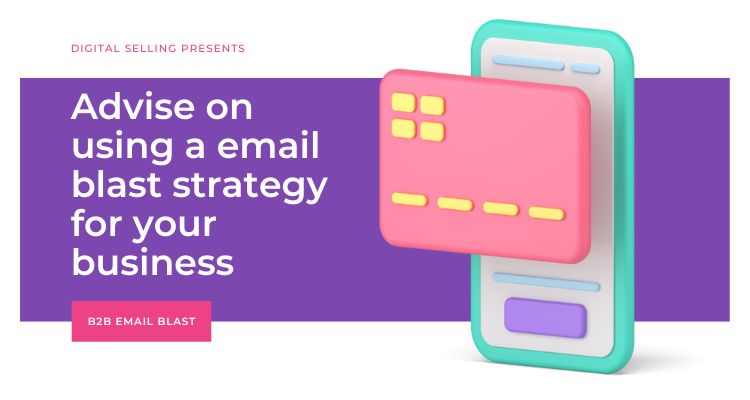Having B2B a email blast strategy is a safe and powerful way of sharing your companies news, offers and new products fast.
Email marketing remains a powerful tool for B2B businesses to reach and engage their target audience. An email blast strategy can be highly effective when executed thoughtfully.
Here are some key tips to help you maximise the impact of your B2B email blast campaigns.
1. Build a Targeted Email List
The foundation of a successful email blast is a high-quality, segmented email list. Segment your list based on factors like industry, company size, and job roles to ensure that your messages are relevant to the recipients. Remember that quality matters more than quantity.
2. Personification is Key
Personification is a critical aspect of B2B email marketing. Use the recipient’s name and tailor the content to their specific needs and pain points. Reference recent interactions or previous purchases when possible. Personalized emails tend to perform much better than generic ones.
3. Compelling Subject Lines
Your subject line is the first thing recipients see. Craft a subject line that is attention-grabbing, concise, and relevant to the content of the email. A well-crafted subject line can significantly increase your email open rates.
4. Valuable Content
Your email content should provide value to the recipient. Address their pain points, offer solutions, and highlight how your product or service can benefit them. High-quality content is more likely to keep readers engaged as well as prompt action.
5. Clear Call to Action (CTA)
Every email should have a clear and compelling call to action. Whether it’s to request a demo, download a whitepaper, or schedule a consultation, make sure the CTA is easy to find and act upon.
6. Mobile Optimization
Many professionals check their emails on mobile devices. Ensure your email template is responsive and looks good on both desktop and mobile screens.
7. A/B Testing
Experiment with different elements of your emails, such as subject lines, content, CTA buttons, and images. A/B testing helps you identify what works best for your audience and refine your strategy accordingly.
8. Avoid Spam Triggers
Be mindful of the content and structure of your emails to avoid being marked as spam. Also, this includes not using excessive capitalisation, excessive exclamation points, or overly promotional language.
9. Consistency
Develop a consistent email schedule to keep your brand top of mind. However, don’t overdo it – find the right balance that keeps you present but not annoying.
10. Analytics and Monitoring
Use email marketing tools to track the performance of your email blasts. Monitor open rates, click-through rates, conversion rates, and other relevant metrics. Use this data to refine your strategy and make improvements over time.
11. Segmented Follow-Ups
After sending an email blast, don’t forget to follow up with segmented messages based on recipient behavior. For instance, you can send a follow-up email to those who opened the initial email but didn’t take action.
12. Compliance with Regulations
Ensure that your email marketing complies with GDPR, CAN-SPAM, and other relevant regulations. This should include an easy way for recipients to unsubscribe, as well as respect their privacy preferences.
13. Engage with Replies
Encourage recipients to reply to your emails and have a team member readily available to engage in one-on-one conversations. Remember, a personal touch can go a long way in building relationships.
14. Feedback and Improvement
Be open to feedback from your recipients. Encourage them to share their thoughts and suggestions. In addition, use this feedback to continually improve your email campaigns.
15. Integration with Other Marketing Channels
Consider how your email marketing strategy aligns with other marketing channels like social media, content marketing, as well as paid advertising. Also, consistency in messaging and branding across channels can reinforce your message.
Final words
In conclusion, a successful B2B email blast strategy requires careful planning and execution. It’s not about sending mass emails but about sending the right emails to the right people with the right message. Personalization, value, and a focus on building relationships are paramount. By following these tips and continually refining your approach based on data and feedback, you can harness the power of email marketing to drive results for your B2B business.

